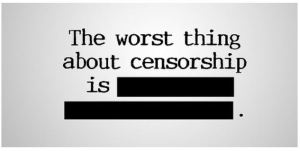Christof Lehmann (nsnbc) : Pakistani authorities intensified their crackdown against media and social media activists accused of criticizing or ridiculing the military in online postings. This includes criticism of the military’s involvement in terrorism abroad, such as the deadly Mumbai attacks in 2008. Is Pakistan, already one of the most dangerous and deadly countries for journalists, boosting its systematic violations of internationally guarantied rights?
 On Sunday, May 14, 2017, it was officially announced that the cyber crime wing of Pakistan’s Federal Investigation Agency (FIA) has been ordered to swiftly move against elements who allegedly are engaging in what was described as “condemnable activities”. Interior Minister Nisar Ali Khan was quoted as warning that “Ridiculing [the] Pakistan army or its officers on social media in the name of freedom of speech is unacceptable” and “a serious offense” under the law, it quoted Interior Minister Nisar Ali Khan as warning. Khan would claim that the Constitution does not permit citizens to indulge in activities that undermine the “prestige, reputation and honor” of the military institution and stress that he had directed the FIA to take strict action against anyone found guilty of posting the content on social media “intentionally or unintentionally.”
On Sunday, May 14, 2017, it was officially announced that the cyber crime wing of Pakistan’s Federal Investigation Agency (FIA) has been ordered to swiftly move against elements who allegedly are engaging in what was described as “condemnable activities”. Interior Minister Nisar Ali Khan was quoted as warning that “Ridiculing [the] Pakistan army or its officers on social media in the name of freedom of speech is unacceptable” and “a serious offense” under the law, it quoted Interior Minister Nisar Ali Khan as warning. Khan would claim that the Constitution does not permit citizens to indulge in activities that undermine the “prestige, reputation and honor” of the military institution and stress that he had directed the FIA to take strict action against anyone found guilty of posting the content on social media “intentionally or unintentionally.”
 The United Nations Human Rights Committee is clear and unambiguous with regard to these problems in Pakistan and elsewhere stressing that speech that is considered insulting, even speech that insults those in position of power, should never be the basis of a criminal prosecution. The crackdown comes amid sustained criticism of the military for issuing a controversial statement days before it was recanted last week. The move purportedly undermined the authority of civilian Prime Minister Nawaz Sharif.
The United Nations Human Rights Committee is clear and unambiguous with regard to these problems in Pakistan and elsewhere stressing that speech that is considered insulting, even speech that insults those in position of power, should never be the basis of a criminal prosecution. The crackdown comes amid sustained criticism of the military for issuing a controversial statement days before it was recanted last week. The move purportedly undermined the authority of civilian Prime Minister Nawaz Sharif.
The civil-military rift arose from a controversial article in the English-language newspaper, Dawn, published in October 2016, that suggested the army was reluctant to crack down on Islamic militants plotting attacks against neighboring Afghanistan and India from sanctuaries on Pakistani soil. Pakistan’s military leadership was “outraged” at the time, pressuring the Sharif administration to set up a high-powered commission to investigate the matter and identify officials responsible for leaking information about a security meeting chaired by the prime minister himself.
In April 2017 this commission submitted its findings, prompting Sharif to fire a key foreign policy aide along with a senior information ministry bureaucrat for allegedly leaking details of the top-level meeting to the media. Hours after the prime minister’s office announced the removals, the military “rejected” Sharif’s actions as “incomplete,” refueling speculations of a showdown between the civilian and military institutions. But the lingering crisis defused last week when the military unexpectedly announced it had resolved the “Dawn Leaks” row with the government and had retracted its statement that “rejected” Sharif’s actions as incomplete.
That said, the high-powered commission would not have been necessary to document the involvement of Pakistan’s military, and its intelligence service ISI in the funding as well as macro- and micro-management of terrorism in neighboring Afghanistan, India, and elsewhere. What the commission “achieved” was forcing PM Nawaz Sharif to fire those involved in disclosing at least some of the military’s and the ISI’s dirty laundry while the military saw its grib on power strengthened by the implementation of the crackdown against “elements” among journalists and social media activists who “intentionally or unintentionally undermine the prestige, reputation and honor of the military institution”.
But then again, the involvement of Pakistan’s military in high-profile terrorist attacks, the systematic policy of turning a blind eye to terrorists operating in Afghanistan and India – among others – has been amply documented in case after case, beyond reasonable doubt. India’s intelligence service, for example, intercepted the phone conversations between the terrorists involved in the 2008 Mumbai attack and their handlers in an operations room in Pakistan.
The audio revealed that the 2008 Mumbai attacks was micro-managed, into the most minute details. The phone calls were obtained by India Express and broadcast in the video below.
Another stark example was the confession of surviving Mumbai attacker Ajmal Kasab after his capture. (See video with Ajmal Kasab’s detailed confession below – English subtitles).
Pakistan’s opposition parties criticized the government for not making the inquiry report public. Independent journalists, media and social media activists as well as rights advocates expressed gravest concern about the government’s secrecy as well as the targeting of those who ask questions, express dissenting opinion, or even those who use caricatures and humor to deal with the military’s systematic involvement in terrorism.
Considering Pakistan’s history of military coups, however, some argue that even the fact that the Commission was allowed to conduct the inquiry was “a very modest but at least some kind of victory for civilian leaders over the generals”, even if the outcome was that those who blew the whistle were fired by Sharif and that the military got its crackdown on dissent anyway.
The announcement of the “crackdown” against “elements” among journalists and social media activists who “intentionally or unintentionally undermine the prestige, reputation and honor of the military institution”, however, suggests that even the smallest of victories in Pakistan have to be paid in blood. The Committee to Protect Journalists (CPJ) ranks Pakistan among the most dangerous countries for journalists.
According to CPJ data, accumulated between 1992 and 2017; 60 journalists in Pakistan were killed, and the motive has been confirmed; Another 21 journalists were killed in incidents where the motive could not be established; Also killed were 7 media workers. These data focus primarily on journalists and media workers from major or relatively well-established media organizations. The numbers would have to be considerably higher if journalists from small independent media organizations, bloggers and social media activists were to be included in the CPJ’s data.
CH/L – nsnbc 17.05.2017
Source Article from https://nsnbc.me/2017/05/17/pakistani-media-and-social-media-activists-targeted-for-criticizing-militarys-involvement-in-terrorism/
 RSS Feed
RSS Feed















 May 17th, 2017
May 17th, 2017  Awake Goy
Awake Goy 










 Posted in
Posted in  Tags:
Tags: 













